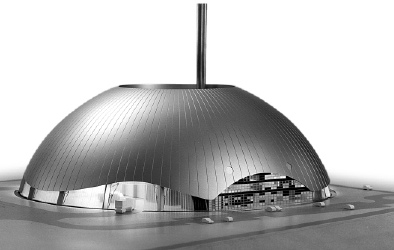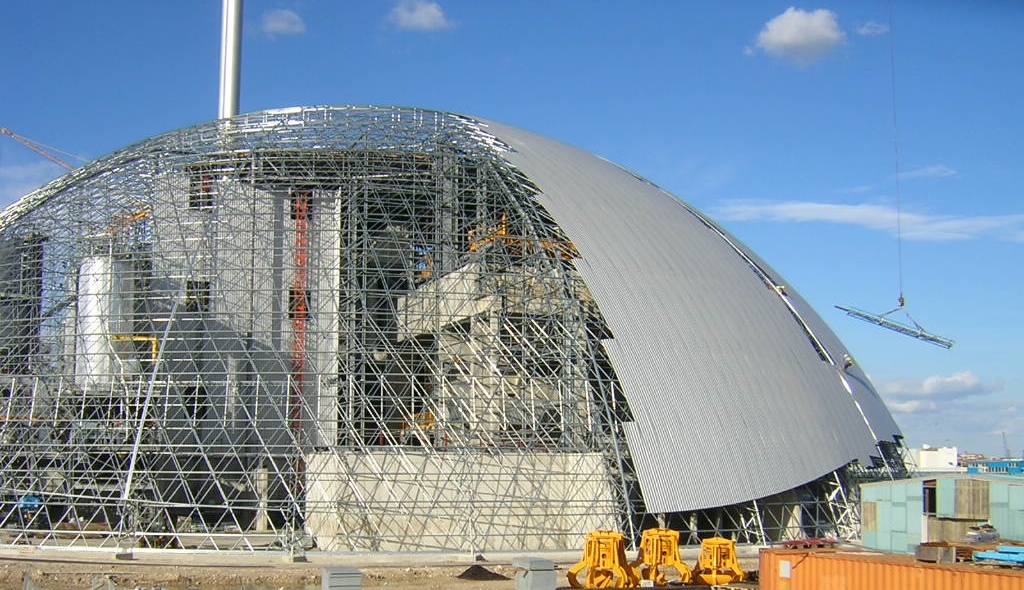A Jewel off Southampton Water
The great silver dome reflected in the nearby water looks surreal. For a long time, however, it seemed that it would never even become real, but remain only an imaginative architect's rendering for a waste-to-energy facility.
But there it is. The dome, designed by renowned French architect, Jeanrobert Mazaud, now conceals and beautifies an incinerator facility, with only the twin chimneys stretching upward through the elegantly curved roof. Since it was completed in 2007, "The Silver Dome" has become a stunning shoreside icon in the United Kingdom community of Southampton, Hampshire, which also plays host to the two great ocean liners, the Queen Elizabeth 2 and the Queen Mary.
From the artist's imagination
Early last decade, faced with at-capacity landfills and 30-year-old incinerators that no longer met emissions requirements, local planners sought an innovative, forward-thinking solution for nonrecyclable waste. They insisted that the new facility be beautiful as well as functional, and issued Mazaud the challenge. He met it head-on with a distinctive design -- a beautiful dome of sweeping curves -- and an equal challenge for the builders. Aside from its whimsical silhouette, this bold dome also would clear-span 110 meters. Here's where the project came close to foundering. Nobody could find an economical way to construct it. "It required very unusual technical solutions, especially for an industrial program," said Mazaud, CEO of S'PACE.S.A.
Large dome? Geometrica!
Contractor CINM of France solicited bids for the dome. But the prices for traditional construction were prohibitive. The owners, Hampshire Waste (now Veolia Environmental Services), described their problem to a potential subcontractor, Jerry Forrest. While traveling for another project, Forrest asked his business contacts who could build such a dome. The answer came quickly: Geometrica, a Texas company, had built several similar-sized domes.
The original design, if built with conventional hot-rolled steel, called for more than 1,000 tons of superstructure. The Geometrica dome, using galvanized structural tubing joined with high-strength aluminum hubs, would weigh less than 300 tons. It also offered all the distinctive architectural features Mazaud required: a “sweep skirt” at the bottom of the dome, delta columns between a translucent wall under the sweep, stack penetrations, and skylights and ventilation near the apex.
Geometrica's proposal was the first that offered to achieve every one of the architect's desired features -- while minding the budget. So Geometrica was awarded the contract. Geometrica's personnel worked closely with the structural engineer to ensure that the dome's framework complied with exacting British engineering and construction standards. Once its off-site manufacturing was complete, Geometrica shipped the prefabricated dome to the Southampton construction site. Assembly took place concurrently with the incinerator building it covered, giving welcome flexibility to a construction schedule that already had been extended to accommodate the search for an economical solution.
Sustainability in spades
The Marchwood Energy Recovery Facility opened in 2007, looking for all the world like an ethereal spacecraft. It is, instead, a complete power plant that supplies electricity to more than 22,000 homes, according to Recycle for Hampshire. "The Marchwood dome does look exceptional when compared to other industrial equipments around," said Mazaud, noting "how much social value good and careful design can bring to a very basic function, such as waste treatment."
Domestic waste is delivered to a bunker inside the dome. Overhead equipment lifts the waste -- now a fuel -- onto a grate for optimum burning. The resulting steam is used for energy, and the ash is further processed to extract metal for recycling. The remaining ash, now reduced to just a small fraction of the incoming materials, is sent for further recycling or disposal. The gases from the boiler are extensively processed before they are released to the atmosphere—scrubbed with lime and activated carbon to remove dioxins. Finally, a bag filter captures dust particulates. The final wastes are used to neutralize other wastes, and the clean gases are released into the atmosphere through the tall stacks.
The facility offers the community many benefits:
Waste management
Recovered energy
Reduced dependence on landfills
Reduced methane from landfills
Reduced use of fossil fuels
Warmth and beauty
“This design keeps the surroundings free of pollutants, both physical and esthetic” said Raul del Toro, director of engineering at Geometrica. “Contrary to what happens in landfills, no waste can permeate into the ground. And the Marchwood dome is an excellent example of how an industrial building can blend nicely into a community. In addition to offering the steel necessary for strength and durability, the Geometrica system made it possible to achieve the architect’s vision."
Free of interior columns, the dome shelters large bins, cranes and hauling equipment that require vast expanses of space. The inside of a free-span structure is, obviously, ideally suited for such a plant. But it is the outside that the community sees and appreciates. And as the architect would have it, no mere lump of coal would do for Southampton's hearth.
Today's reality is that, as the newly generated power warms nearby homes, a new jewel graces Southampton Water.
For more information about industrial use of Geometrica domes, see Industrial Domes. If you need a dome, or if you would like to receive our newsletter, please send us your information using the following inquiry form.







